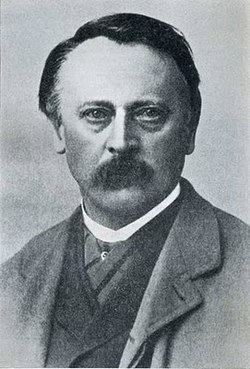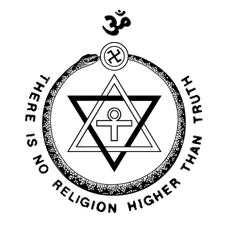You can help expand this article with text translated from the corresponding article in German. (May 2015) Click [show] for important translation instructions.
|
This article needs additional citations for verification. (January 2021) |
Franz Hartmann | |
|---|---|
 | |
| Born | 22 November 1838 |
| Died | 7 August 1912 (aged 73) |
| Part of a series on |
| Theosophy |
|---|
 |
Franz Hartmann (22 November 1838, Donauwörth – 7 August 1912, Kempten im Allgäu) was a German medical doctor, theosophist, occultist, geomancer, astrologer, and author.
Biography
[edit]Hartmann was an associate of Helena Blavatsky and was Chairman of the Board of Control of the Theosophical Society Adyar.[1] He collaborated with the mystic Carl Kellner. He published the journals Lotusblüthen (1893-1900) and Neue Lotusblüten (1908-1913). He wrote articles on yoga and popularized the subject within Germany.[1]
He has been described as "one of the most important theosophical writers of his time".[1] His works include several books on esoteric studies and biographies of Jakob Böhme and Paracelsus. He translated the Bhagavad Gita into German and was the editor of the journal Lotusblüten. He was at one time a co-worker of Helena Blavatsky at Adyar. In 1896 he founded a German Theosophical Society. He also joined and supported the far-right esotericist Guido-von-List-Society (Guido-von-List-Gesellschaft) which was a modern Pagan new religious movement which promoted Wotanism, a proposed revival of the religion of the ancient German race, and which included an inner set of openly racist Ariosophical teachings that Guido-Von-List termed Armanism.
According to Theodor Reuss he was one of the original founders of the magical order that would later be known as Ordo Templi Orientis, along with Reuss, Carl Kellner and others.
Works
[edit]- Magic: White and Black (London, 1886)
- Life and the Doctrines of Philippus Theophrastus Bombast of Hohenheim Known as Paracelsus (1887)
- Geomancy (London 1889)
- The Talking Image of Urur (New York, 1890)
- The Life and Doctrines of Jacob Boehme (1891)
- Occult science in medicine (1893), United Kingdom: Theosophical Publishing Society
- Among the Gnomes: An Occult Tale of Adventure in the Untersburg (1895), London: T. Fisher Unwin
- The Life of Jehoshua, the Prophet of Nazareth
- The Principles of Astrological Geomancy
- Correlation of Spiritual Forces
- With the Adepts: An Adventure Among the Rosicrucians
- In the Pronaos of the Temple of Wisdom Containing the History of the True and the False Rosicrucians
- Alchemy and Astrology
- Metafisica Medicina y Sanacion
- Philosophy and Theosophy
- The Four Pillars of Occult Medicine
- An Adventure Among the Rosicrucians: A Student of Occultism
- Among the Adepts: The Brotherhood of the Golden and Rosy Cross and Their Occult and Mysterious Powers
- To Will, to Dare and to Be Silent in Magic
See also
[edit]- Christianity and Theosophy
- Theosophists as fiction writers
- Buried Alive (1895)
References
[edit]- ^ a b c Baier, Karl. (2018). Yoga within Viennese Occultism: Carl Kellner and Co. In Karl Baier, Philipp André Maas, Karin Preisendanz. Yoga in Transformation: Historical and Contemporary Perspectives. Vienna University Press. pp. 395-396. ISBN 978-3-7370-0862-4
External links
[edit]- The Life and the Doctrines of Paracelsus (1887), by Franz Hartmann
- The Life and the Doctrines of Jacob Boehme (1891), by Franz Hartmann
- Occult science in medicine (1893), by Franz Hartmann
- Among the gnomes : An occult tale of adventure in the Untersberg (1895), by Franz Hartmann
- In The Pronaos of the Temple of Wisdom Containing the History of the True and the False Rosicrucians With an Introduction into the Mysteries of the Hermetic Philosophy by Franz Hartmann
- Magic, White and Black or The Science of Finite and Infinite Life Containing Practical Hints for Students of Occultism by Franz Hartmann Third Edition Fourth Edition Fourth American Edition Fifth American Edition Eighth American Edition
- Occult Science in Medicine by Franz Hartmann
- Personal Christianity: A Science: The Doctrines of Jacob Boehme, The God-Taught Philosopher With an Introduction and Notes by Franz Hartmann
- The Life of Jehoshua, the Prophet of Nazareth: An Occult Study and a Key to the Bible, Containing the History of an Initiate by Franz Hartmann
- The Life of Philippus Theophrastus Bombast of Hohenheim Known by the Name of Paracelsus and The Substance of His Teachings by Franz Hartmann
- The Principles of Astrological Geomancy, The Art of Divining by Punctuation According to Cornelius Agrippa and Others by Franz Hartmann
- With the Adepts: An Adventure Among the Rosicrucians by Franz Hartmann First Edition Second Edition
- Contents of Lotusblüten 1893-1900
- Contents of Lotusblüten 1908-1914
- Memorable Recollections from the life of the author of the "Lotusblüten".
- The Life of Jehoshua, the prophet of Nazareth - full text
- Digital edition of "Beitrag zur Litteratur über die Wirkung des Chloroforms" by the University and State Library Düsseldorf